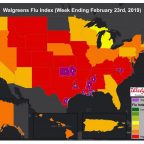“Doggie breath” could be a sign of life-threatening disease: AVMA
Fido’s or Fluffy’s bad breath could be more than an odor problem; it might signify a serious health risk with the potential to damage not only the animal’s teeth and gums but its internal organs as well.
To address the importance of oral health care for pets, the American Veterinary Medical Association (AVMA) is sponsoring National Pet Dental Health Month® in February.
AVMA President Dr. Mike Topper says regular dental exams are an integral and primary component of a pet’s overall health care, and can help prevent more serious health problems.
“Oral disease is the most frequently diagnosed health problem for pets; it’s also entirely preventable,” said Dr. Topper. “Twice-a-year checkups, including an oral health checkup, are important to ensure your pet is not in pain and is not suffering from serious oral health problems. Besides causing receding gums and tooth loss, bacteria in the mouth can enter the bloodstream, potentially infecting the heart, liver and kidneys, which can be potentially life threatening.
“Just as the public has come to realize that their own oral health is linked to their overall health, veterinarians want people to understand that dental health care is essential to maintaining the overall health and well-being of the family pet.”
Routine cleanings can help prevent periodontal disease and save money in the long run. A 2014 analysis conducted by Veterinary Pet Insurance Co. showed that the average cost per pet to prevent dental disease is just one-third of the average cost of treating dental disease. More importantly, a complete oral examination can detect hidden health problems. Even if your pet’s breath smells fine, there still could be dental conditions that are hard to spot without a complete veterinary exam.
While regular dental checkups are essential to help maintain your pet’s dental health, there are a number of signs that dental disease has already started. If you notice any of the symptoms below, take your pet in to your veterinarian immediately:
- Red swollen gums
- Bad breath (similar to the smell of a rotten egg)
- Teeth that are broken, loose, discolored or covered in tartar
- Abnormal chewing, drooling or dropping food from the mouth
- Bleeding from the mouth
- Shying away from you when you touch the mouth area
- Frequent pawing or rubbing at the face and/or mouth
- Reduced appetite or refusal to eat
- Weight loss
In addition to professional dental care, Dr. Topper advises pet owners to make oral home care part of their pet’s routine as a way to prevent tooth decay. Veterinarians can help pet owners begin a pet dental care routine at home, and encourage them to continue regular veterinary checkups to monitor their pets’ oral health.
To learn more about dental care for pets, including an instructional video on brushing pets’ teeth, visit avma.org/petdental.
The AVMA, founded in 1863, is one of the oldest and largest veterinary medical organizations in the world, with over 91,000 member veterinarians worldwide engaged in a wide variety of professional activities and dedicated to the art and science of veterinary medicine.






